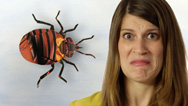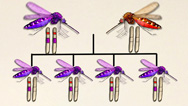The Myth of Laziness
- By Anna Rothschild
- Posted 05.05.16
- NOVA
The stereotype of the "lazy Southerner" may have been caused by a parasitic infection.
Transcript
The Myth of Laziness
Posted: May 5, 2016
Could a parasitic illness be the reason an entire population was thought of as lazy? That may in part be what rampant hookworm infections did to the rural poor in the American South for over a century.
I’m Anna Rothschild and this is Gross Science.
Human hookworms are nematodes that live in warm, moist climates throughout most of the world. You get them by coming in contact with contaminated soil, say by running around barefoot. That’s when tiny hookworm larvae, under a millimeter long, can wriggle into your skin. This isn’t painful, but it might cause a little itchiness at the point of entry, called “ground itch.” Meanwhile, the larvae begin a grand tour of your body.
They enter your bloodstream and pass through your heart en route to your lungs. Then, they migrate up your windpipe into your throat and you swallow them, at which point they make the long journey down your digestive tract. Finally, they end up in your small intestines where the larvae mature, mate, and bite into the lining of your gut to drink your blood, often for years at a time. The females release thousands of eggs per day, which you poop out, starting the cycle again.
People have been known to have hundreds of worms in their guts at a time. And the more worms you have, the worse your symptoms can be. A hookworm infection rarely kills you on its own, but it can cause anemia, protein deficiency, gastrointestinal problems, weight loss, and fatigue. Basically, it makes you weak and tired. And if you have a bad case of it as a child, the severe anemia can lead to stunted growth and stunted cognitive development.
And that’s where the stigma of the lazy, slow Southerner comes in. Now, I’m not sure how prevalent this prejudice is in America today—it wasn’t something I ever heard growing up. But when you recognize that in the early 20th century (when that stigma was quite strong) up to 40% of people in certain parts of that region had hookworm, that stereotype, while deeply unjust, starts to make a bit of sense. It’s no wonder that workers were weak and children had trouble in school.
So, why did so many Southerners have hookworm? Well, both the climate, and the sandy soil of some parts of the South were ideal for the parasite’s lifecycle. But on top of that, it largely affected poor communities where kids may have run around without shoes, and effective sanitation and plumbing were not common. It was one of a few diseases in the American South that thrived because of widespread poverty, and likely also perpetuated that poverty.
In the early 1900s there was a huge campaign to eradicate the disease and educate people about the parasite. It’s totally treatable with medications, but preventing reinfection requires some pretty fundamental lifestyle changes. It ended up taking decades to get it under control, and today very few people in the US actually get hookworm.
Many other places in the world, however, are not so lucky. Right now, according to the CDC, up to 740 million people are infected with hookworm. It’s just one of many neglected diseases that sap people’s vitality worldwide, and may trap them in poverty. And if that’s not gross, I don’t know what is.
Ew.
This video was inspired by Rachel Nuwer’s excellent article for NOVA Next on hookworms in the American South. She goes into way more detail about the history of the disease, the impact of it on the region, how it was first identified, the eradication efforts and how the public responded to them, and finally, about new approaches to treating it worldwide today. She even talks about a potential new vaccine. Anyway, I’ll include a link to the piece below. It’s definitely worth reading.
Credits
PRODUCTION CREDITS
- Host, Writer, Animator, Editor
- Anna Rothschild
- Camera, Sound
- Sophie Benson
- Easy Come Blues (Dobro Version)
- Music Provided by APM
- © WGBH Educational Foundation 2016
FOOTAGE AND IMAGES
- The following videos and images were use courtesy of the Rockefeller Archive Center. Thank you!
- Pot Belly: http://rockefeller100.org/items/show/1677
- School Children with Hookworm Disease: http://rockefeller100.org/items/show/1736
- County Dispensary: http://www.rockefeller100.org/items/show/1676
- Unhooking the Hookworm: https://www.youtube.com/watch?v=aqBoT_DyOsI
- Hookworm - Necator americanus (New World hookworm)
- ©David Scharf/Corbis
- Hookworm filariform larva. Nematode, worm, parasite.
- CDC/Dr. Mae Melvin
- Hookworm egg undergoing the process of cellular division
- CDC
- Newspaper Article
- Herald Democrat. October 29, 1909
- Historic diagram showing unsanitary placement of a farm house privy
- CDC/Minnesota Department of Health, R. N. Barr Library; Librarians Melissa Rethlefsen and Marie Jones
SFX
- Cockroaches
-
Freesound/StateAardvark
(used with permission from author) - Squeak Pack/squeak_10
- Freesound/Corsica_S
- Swishes
- Freesound/Pogotron
- Projector Screen Pull in/out
- Freesound/YOH
- Jelly Mangling on Plate
- Freesound/lolamadeus
- Poof of Smoke
- Freesound/planman
- Bubbles Popping
- Freesound/ch0cchi
- Produced by WGBH for PBS Digital Studios
POSTER IMAGE
- County Dispensary
- Courtesy the Rockefeller Archive Center
Sources
Want more info?
Rachel Nuwer’s NOVA Next Article—How a Worm Gave The South a
Bad Name:
http://www.pbs.org/wgbh/nova/next/nature/how-a-worm-gave-the-south-a-bad-name/
The CDC on Hookworm:
http://www.cdc.gov/parasites/hookworm/
Health Affairs—How Four Once Common Disease Were Eliminated
From The American South:
http://content.healthaffairs.org/content/28/6/1734.short
Sabin Vaccine Institute on the Human Hookworm Vaccine:
http://www.sabin.org/programs/vaccine-development/human-hookworm-vaccine
The New Yorker—The War of the Worms:
http://www.newyorker.com/tech/elements/war-of-the-worms
Related Links
-

Gross Science
Bizarre stories from the slimy, smelly, creepy world of science.
-

I Was a Gross Kid
Gross Science host Anna Rothschild explains why she is so obsessed with gross stuff.
-

Three Facts About Periods
Knowing more about periods is important for everyone’s health.
-

No More Mosquitoes?
A new technology could make diseases like Zika a thing of the past. But should we use it?

